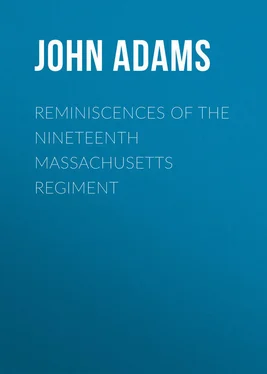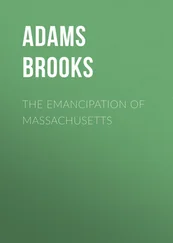John Adams - Reminiscences of the Nineteenth Massachusetts regiment
Здесь есть возможность читать онлайн «John Adams - Reminiscences of the Nineteenth Massachusetts regiment» — ознакомительный отрывок электронной книги совершенно бесплатно, а после прочтения отрывка купить полную версию. В некоторых случаях можно слушать аудио, скачать через торрент в формате fb2 и присутствует краткое содержание. Жанр: foreign_antique, foreign_prose, Историческая проза, на английском языке. Описание произведения, (предисловие) а так же отзывы посетителей доступны на портале библиотеки ЛибКат.
- Название:Reminiscences of the Nineteenth Massachusetts regiment
- Автор:
- Жанр:
- Год:неизвестен
- ISBN:нет данных
- Рейтинг книги:4 / 5. Голосов: 1
-
Избранное:Добавить в избранное
- Отзывы:
-
Ваша оценка:
- 80
- 1
- 2
- 3
- 4
- 5
Reminiscences of the Nineteenth Massachusetts regiment: краткое содержание, описание и аннотация
Предлагаем к чтению аннотацию, описание, краткое содержание или предисловие (зависит от того, что написал сам автор книги «Reminiscences of the Nineteenth Massachusetts regiment»). Если вы не нашли необходимую информацию о книге — напишите в комментариях, мы постараемся отыскать её.
Reminiscences of the Nineteenth Massachusetts regiment — читать онлайн ознакомительный отрывок
Ниже представлен текст книги, разбитый по страницам. Система сохранения места последней прочитанной страницы, позволяет с удобством читать онлайн бесплатно книгу «Reminiscences of the Nineteenth Massachusetts regiment», без необходимости каждый раз заново искать на чём Вы остановились. Поставьте закладку, и сможете в любой момент перейти на страницу, на которой закончили чтение.
Интервал:
Закладка:
We marched two days and encamped about two miles from the enemy’s works before Yorktown. We pitched our shelter tents for the first time, and began army life in earnest. Our rations were served to us uncooked, and company cooks ordered to the ranks. A company cook is a peculiar being; he generally knows less about cooking than any man in the company. Not being able to learn the drill, and too dirty to appear on inspection, he is sent to the cook house to get him out of the ranks. We were not sorry when the cook house was abolished.
The first day after our arrival the 19th and 20th Massachusetts regiments, under command of General Dana, were ordered to reconnoitre the enemy’s works. We discovered a fortification near Winn’s Mill, and the 19th was ordered to march through a piece of woods, then along the front, and discern its extent. We did this under a sharp fire of musketry. It was not our intention to attack, but as Company E, commanded by the brave but impulsive Captain Mahoney, was fired upon, he ordered the men to charge the works, and would have done so had not Colonel Hincks recalled him. Like a true Irishman that he was, he did not propose to be fired upon and not fight. The regiment behaved splendidly under fire; when the musketry was the hottest the clear voice of Colonel Hincks was heard. “Change front, forward on first company!” was the order, and it was executed as correctly as on drill. We lost the first man killed in this skirmish. Andrew Fountain of Company D, Captain Wass, and several of Company K were wounded.
We went into camp and began to erect fortifications; for nearly a month we were engaged in that work, besides building corduroy roads and doing picket duty. While on picket Wm. Morgan was badly wounded by a piece of shell. He was the first man wounded in Company A.
Our camp was located in a swamp; the rain was almost constant, and the ground like a sponge. Sickness prevailed to an alarming extent; it was not an uncommon thing to march half of the company to sick call, but not all who went were sick. Active service had tired some who, when we were in camp in Maryland, were anxious to fight, and were constantly grumbling because we were not ordered in. Picket duty under fire had given these few the “shell fever.” Loss of voice was the trouble with many, caused by severe colds. One day I marched my squad of invalids to the hospital tent; with them was one of the loudest talking men in the company, but that morning he could only whisper. After the doctor had examined them all he gave me the list of excused, and my voiceless comrade was not down. “Hasn’t he excused me?” said B. “No,” was my reply, in a voice that could be heard a quarter of a mile. “D – n him, I am the sickest man in the company,” was his indignant answer; but he went on duty just the same, and never again answered sick call until wounded. Such cases were the exception, however, and every day the number grew less, as our men were ordered back to general hospital.
The works we were erecting were of the strongest kind, as it was intended to besiege Yorktown, and the heaviest guns were mounted for that purpose. Sunday morning, May 4, found the regiment on picket duty. It had been a lively night, as the shelling had been constant. Lieutenant Hume, in charge of an outpost, believed that the rebels had left the works in his front; sending his opinion back to the commanding officer, he started to cross the field. No gun was fired and he continued on. The regiment was then ordered forward double quick, as others had seen Lieutenant Hume and were anxious to be first in the works, but the 19th could run either to the front or rear and our flags were the first to float from the fortifications. We found the portholes filled with Quaker guns (logs of wood). Men of straw were stationed as gunners. Every indication of a hasty retreat was shown, as in the camps in the rear of the works we found fires and breakfast smoking hot, which we eagerly disposed of. We also found letters ready for mailing, which went by northern mail instead of southern, as we sent them home.
We marched back to our old camp, packed up, and Monday morning, in a drenching rain, marched from Winn’s Mill to Yorktown. We were on the road all night and only made three miles. The mud was knee deep; we could not go out of line as the ground was full of torpedoes, yet, in all our misery, Company A started one of our old camp songs, which was taken up by other companies in the regiment, then by other regiments in the brigade, and soon the entire army was singing. This continued nearly all night. The next day we took steamers, and at night arrived at West Point. We remained on board until morning, then landed, and finding our forces engaged we were ordered to support Captain Porter, 1st Massachusetts battery. At West Point we saw a feature that we never saw before, or at any other time during the war. It was a human telegraph. A line of men was deployed some twenty feet apart, and extended from the line of battle to headquarters. The men at the front would start the message, and it would be repeated by each turning the head to the rear as he spoke. One message I remember, – “Send a man to take Daniel Webster’s place.” We supposed Daniel had been shot, but if a man was wanted to fill the place of our lamented Daniel Webster, we did not think Company A could spare the man. After a sharp fight the rebels fell back and we began the march up the peninsula. The condition of the roads was such that we halted more than we marched, but at last we reached the banks of the Chickahominy River, and were ordered on picket between Bottom and Grape Vine bridges.
Saturday, May 31, the battle of Fair Oaks began. We were not relieved from picket until Sunday morning, when we were ordered to the front; here we were marched from right to left and left to right, constantly under fire but not really engaged. We were at times passing over portions of the field that had been held by the rebels, and the ground was strewn with the dead and wounded. When the battle ended we were ordered on picket, where we remained ten days, having a brush with the rebel pickets every day. We were then given a few days’ rest and ordered to the front, where we threw up a line of works and remained there while the army held the advance position.
On the 25th of June General Hooker asked for one regiment from Sumner’s corps to assist in the attack on the rebel lines in our front. The 19th was selected. We advanced in front of our intrenchments and were soon hotly engaged. Led on by our gallant colonel, we soon had the rebels in full retreat, and had the army advanced at that time I am confident we could have marched into Richmond in five hours, as we were only a few miles from the city. Just as we were ready to make the final charge an aid came to Colonel Hincks and said, “You are ordered to fall back.” “What for?” said the colonel. “Don’t you see we have got them on the run?” But the order was peremptory and back we went. Our loss was very heavy for the short time engaged. Lieutenant Warner of Company H and several men were killed; Lieut. J. H. Rice, Sergt. Samuel H. Smith, William R. Meldon, Benjamin Jellison and others, in all about sixty, badly wounded.
While we had been under fire nearly all the time since arriving at Yorktown, this was the first square fight in which we had been engaged. We had no chance for the use of tactics as the woods were thick and we could see little of the enemy; but the officers and men behaved splendidly, and our only regret was to lose so many and accomplish nothing, an experience that the Army of the Potomac often had in the battles that followed.
CHAPTER V
Company A had in its ranks men of every trade and profession, not excepting the clergy. Our minister might have been a good soldier in the army of the Lord, but was not a success in the Army of the Potomac. At the first fire he scattered and could not be rallied. I said to him, “You have been telling the boys to get ready to die, but you are not in good marching order for the other shore yourself.” “That is not it,” replied Levi; “I should not have enlisted; it always made me nervous to hear a gun fired and I don’t believe I can get used to it.” As will be shown later he never did.
Читать дальшеИнтервал:
Закладка:
Похожие книги на «Reminiscences of the Nineteenth Massachusetts regiment»
Представляем Вашему вниманию похожие книги на «Reminiscences of the Nineteenth Massachusetts regiment» списком для выбора. Мы отобрали схожую по названию и смыслу литературу в надежде предоставить читателям больше вариантов отыскать новые, интересные, ещё непрочитанные произведения.
Обсуждение, отзывы о книге «Reminiscences of the Nineteenth Massachusetts regiment» и просто собственные мнения читателей. Оставьте ваши комментарии, напишите, что Вы думаете о произведении, его смысле или главных героях. Укажите что конкретно понравилось, а что нет, и почему Вы так считаете.












